#university/institutional research administration
Text
What’s your occupation or career, area of study, and/or any topic(s) about which you have you have a lot of expertise??
Asking for fun and also to start a collection of miscellaneous field experts who can answer the random but highly specific questions a writer has when working on a fic/novel
#it’s called NETWORKING#mine are:#research#university/institutional research administration#academia (regretful)#clinical psychology#counseling#I was a therapist for almost 2 years#psychological assessments and evaluations#neuroscience#ummm#research project/grant management#grant planning and logistics#for a US private institution so it’s not universal knowledge ofc#but it received 1 billion in research funding this year so that counts for something right?
15 notes
·
View notes
Text
Alzheimer, uma doença autoimune 1.2
O psiquiatra alemão Alois Alzheimer descreveu o primeiro caso do estado que leva seu nome em 1906. Mais de um século depois, a comunidade científica ainda não compreende os mecanismos exatos. Manuel Ansede – El País. O Globo – 06/03/2024 in: Jesus Hemp – 2024 abr 15
haydenbird – Getty Images
Em um artigo publicado numa terça-feira (20/09/2022), o professor de química Donald Weaver, diretor do…

View On WordPress
#Alzheimer pode ser uma doença autoimune# amiloide# Anvisa EUA# Augusto Dala Costa - terra# Bethânia Nunes - Metrópoles# biólogo belga Bart De Strooper principais especialistas mundiais Alzheimer# Centro para a Pesquisa do Cérebro e suas Doenças em Lovaina# cidade belga de Tielt 64 anos# Cientistas da Universidade de Toronto# consórcio internacional# dados falsificados# distúrbio do sistema imunológico# doença autoimune cérebro# e não uma condição cerebral# Food and Drug Administration FDA# haydenbird/GettyImages# Manuel Ansede - El País. O Globo# organização sem fins lucrativos Alzheimer’s Disease International# portal Science Alert# previsão reveladora humanidade# principal estudo sobre a beta-amiloide 2006# professor de química Donald Weaver diretor do laboratório Krembil Research Institute University Health Network Canadá# psiquiatra alemão Alois Alzheimer# SaúdeTags# tratamento da doença de Alzheimer#fake news#Medicinal
1 note
·
View note
Text

Medical School Student Mod | Sims 4
Requirements:
EP01: Get to Work
EP08: Discover University
XML Injector by SCUMBUMBO
Have you ever wanted your Sims to go to medical school before entering the doctor career? Or maybe your Sim just wants to go to medical school for the hell of it! Well in my pursuit of adding more gameplay mods to my save for better storytelling, I created this medical school student career track! I made this career available for Teens-Adults.
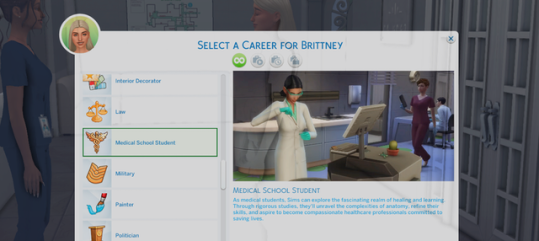
Applying to Medical School
Even though the medical school track, is technically a joinable career, I still wanted to create the opportunity for your Sims to apply to medical school! Applying will take about 3-4 hours and will cost them §500.

Medical Institutions:
Your Sim will be randomly placed at one of the following medical institutions:
-The Landgraab School of Medicine
-University of Britchester School of Medicine
-Foxbury Institute of Medicine and Health Sciences
-Plumbob Center of Medicine
-Newcrest Center for Medicinal Sciences
-Komorebi Institute of Medicinal Studies
-University of Willow Creek, Goth School of Medicine
Again, their placement will be randomized. If you want your Sim to work at a specific medical institute, you can quit and rejoin the career until you get your desired one.
Pay:
Your Sims will be unpaid until they become an intern (Level 5). For the first four levels, it is up to you to decide how (or if) your Sims will make simoleons. I recommend the Unlimited Jobs mod by TURBODRIVER, which allows you to have multiple jobs at a time. You can check it out here if you like.
Career Track
This career track comes with 9 levels:
Preclinical Med Student I: (§0)
Starting your journey into the medical field, you're diving into basic sciences and learning the foundational concepts of medicine. It's a challenging start, but with hard work, you'll build the knowledge needed for your future career.
Preclinical Med Student II: (§0)
With the first year behind you, you're now diving deeper into complex medical subjects. Balancing intense coursework and initial patient interactions, you're beginning to see how your studies apply to real-world healthcare.
Preclinical Med Student III: (§0)
Transitioning from the classroom to clinical rotations, you're getting hands-on experience in various specialties. Your understanding of medicine is growing rapidly as you apply your knowledge to real patients under supervision.
Preclinical Med Student IV: (§0)
In the final phase of your medical school journey, you're solidifying your skills and preparing for the next step. As you complete your rotations and apply for residency programs, you're focused on becoming a competent and compassionate doctor.
Intern: (§10)
Welcome to the first year of residency! As an intern, you're now a doctor, responsible for patient care under the guidance of senior physicians. The hours are long, but each day brings invaluable learning experiences and growth.
Junior Resident: (§15)
With a year of internship behind you, you're now taking on more responsibilities. Your confidence is building as you make more independent decisions and start to specialize in a particular field of medicine.
Senior Resident:(§20)
Nearing the end of your residency, you're a seasoned doctor with a wealth of clinical experience. You're mentoring interns and junior residents while honing your expertise and preparing for the final stages of your training.
Chief Resident: (§25)
As the chief resident, you're a leader among your peers, coordinating the residency program and ensuring the smooth operation of the team. Your skills and leadership abilities are put to the test as you balance administrative duties with patient care.
Fellow: (§35)
Specializing further, you're now a fellow, focusing on a particular area of medicine. This stage is all about mastering your chosen field, conducting research, and becoming a true expert before transitioning to an attending physician role.
Hours:
The hours for this career track are LONG! Again, I wanted to add as much realism as I could. So, expect your Sim to be gone for practically the entire day! They most likely will come back home with a tense/dazed buff.
Skills and Objectives
The major skills your Sim will be focusing on in this career are Logic, Writing, Handiness, and Research & Debate. Your Sims objectives are essentially to progress these skills to the required levels.
Computer Interactions and Rabbitholes:
There is a separate in-game pie menu for Medical Students on computers. This comes with nine (9) new interactions and rabbithole activities for your Sims!
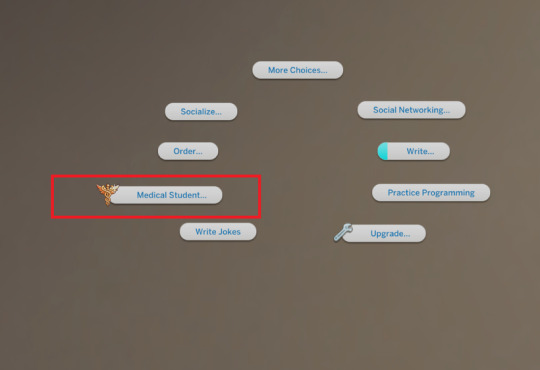
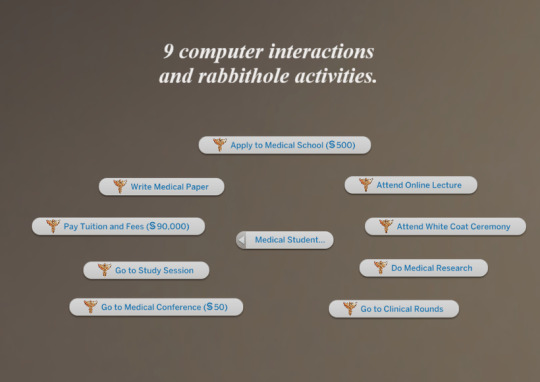
The time for each activity varies; but expect your Sim to spend HOURS doing most of them lol (for example, the Medical Conference may take 3-4 hours, and going to Clinical Rounds may take 5-6 hours. For rabbithole activities, your Sim will go to the computer first, before leaving. Also be ready to spend some simoleons on activities such as paying tuition, going to conferences, and textbooks (SEE BELOW)
Textbooks:
What is medical school without textbooks...and expensive ones too?! I added four (4) new textbooks. They total to about§500. They're also located under the Emotional category since they give your Sims a Focused buff, which can help them build their skills.



Lot Traits:
For those who want to take their gameplay up a notch, I created a Medical School Lot Trait. But because we don't have medical school lots in game, if you plan on building a medical school for your Sims, it will most likely have to be on a generic lot.

Buffs:
Several buffs come in game with the various interactions! Here is a quick snapshot of a few:

Trait & Conversation Topics:
Lastly, I also created a CAS trait for your Sims who are/ or want to become medical students. This trait comes with basic wants such as wanting to go to the library or researching something on Simpedia. The trait itself should be in the Lifestyle category.
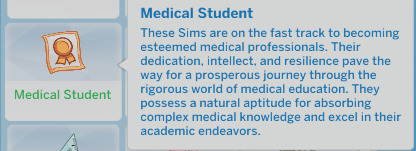
Also, Sims with this trait will have the following conversation topics available to them:
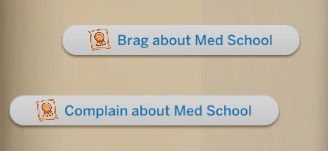
Important:
Please make SURE that you have the XML Injector installed; and that you have script mods enabled. Also try not to separate package and script files or place script files more than 2 folders deep!
Known Problems/ Conflicts:
As of now, there are no reported conflicts or problems with this mod. Feel free to join the discord to let me know of any issues that you detect.
Update Log:
5/17/2024
As requested, I added the postgraduate positions such as interns, as well as junior, senior and chief residents, and fellows. I also added pay for these levels.
5/21/2024
MOD IS CURRENTLY BEING UPDATED (WITH MORE GAMEPLAY FEATURES 😊)
BECOME A FREE PATRON OR PAID MEMBER TO GET UPDATES!
5/22/2024
Additional gameplay features were added. If you downloaded the old files before on this date, PLEASE DELETE, AND REPLACE WITH THE NEW FILES.
T.O.U.
Please do not claim this mod as your own.
Please do not upload this mod to any other websites.
Please let me know before translating this mod.
FOR DOWNLOAD AND MORE INFORMATION, visit my Patreon.
elle.
2K notes
·
View notes
Text
"Don't spy on a privacy lab" (and other career advice for university provosts)
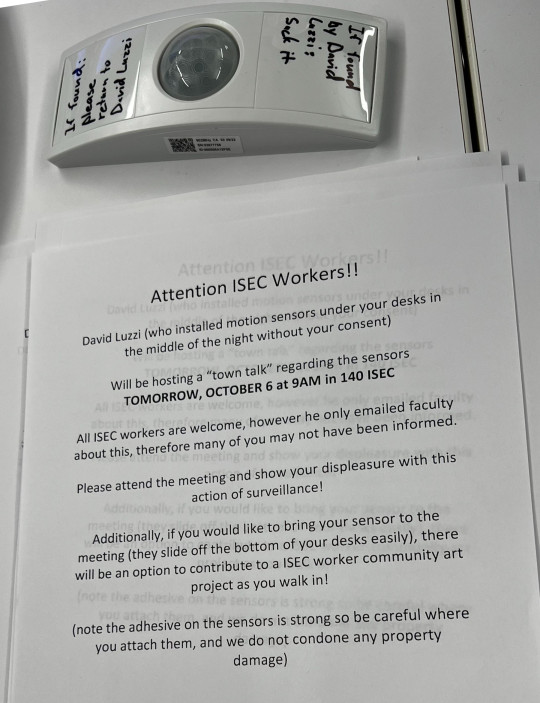
This is a wild and hopeful story: grad students at Northeastern successfully pushed back against invasive digital surveillance in their workplace, through solidarity, fearlessness, and the bright light of publicity. It’s a tale of hand-to-hand, victorious combat with the “shitty technology adoption curve.”
What’s the “shitty tech adoption curve?” It’s the process by which oppressive technologies are normalized and spread. If you want to do something awful with tech — say, spy on people with a camera 24/7 — you need to start with the people who have the least social capital, the people whose objections are easily silenced or overridden.
That’s why all our worst technologies are first imposed on refugees -> prisoners -> kids -> mental patients -> poor people, etc. Then, these technologies climb the privilege gradient: blue collar workers -> white collar workers -> everyone. Following this pathway lets shitty tech peddlers knock the rough edges off their wares, inuring us all to their shock and offense.
https://pluralistic.net/2022/08/21/great-taylors-ghost/#solidarity-or-bust
20 years ago, if you ate dinner under the unblinking eye of a CCTV, it was because you were housed in a supermax prison. Today, it’s because you were unwise enough to pay hundreds or thousands of dollars for “home automation” from Google, Apple, Amazon or another “luxury surveillance” vendor.
Northeastern’s Interdisciplinary Science and Engineering Complex (ISEC) is home to the “Cybersecurity and Privacy Institute,” where grad students study the harms of surveillance and the means by which they may be reversed. If there’s one group of people who are prepared to stand athwart the shitty tech adoption curve, it is the CPI grad students.
Which makes it genuinely baffling that Northeastern’s Senior Vice Provost for Research decided to install under-desk heat sensors throughout ISEC, overnight, without notice or consultation. The provost signed the paperwork that brought the privacy institute into being.
Students throughout ISEC were alarmed by this move, but especially students on the sixth floor, home to the Privacy Institute. When they demanded an explanation, they were told that the university was conducting a study on “desk usage.” This rang hollow: students at the Privacy Institute have assigned desks, and they badge into each room when they enter it.
As Privacy Institute PhD candidate Max von Hippel wrote, “Reader, we have assigned desks, and we use a key-card to get into the room, so, they already know how and when we use our desks.”
https://twitter.com/maxvonhippel/status/1578048837746204672
So why was the university suddenly so interested in gathering fine-grained data on desk usage? I asked von Hippel and he told me: “They are proposing that grad students share desks, taking turns with a scheduling web-app, so administrators can take over some of the space currently used by grad students. Because as you know, research always works best when you have to schedule your thinking time.”
That’s von Hippel’s theory, and I’m going to go with it, because the provost didn’t offer a better one in the flurry of memos and “listening sessions” that took place after the ISEC students arrived at work one morning to discover sensors under their desks.
This is documented in often hilarious detail in von Hippel’s thread on the scandal, in which the university administrators commit a series of unforced errors and the grad students run circles around them, in a comedy of errors straight out of “Animal House.”
https://twitter.com/maxvonhippel/status/1578048652215431168
After the sensors were discovered, the students wrote to the administrators demanding their removal, on the grounds that there was no scientific purpose for them, that they intimidated students, that they were unnecessary, and that the university had failed to follow its own rules and ask the Institutional Review Board (IRB) to review the move as a human-subjects experiment.
The letter was delivered to the provost, who offered “an impromptu listening session” in which he alienated students by saying that if they trusted the university to “give” them a degree, they should trust it to surveil them. The students bristled at this characterization, noting that students deliver research (and grant money) to “make it tick.”
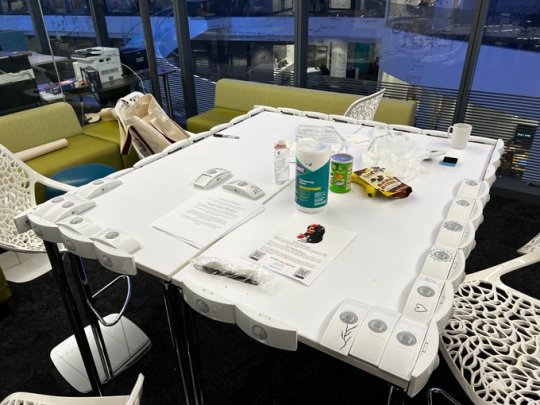
[Image ID: Sensors arrayed around a kitchen table at ISEC]
The students, believing the provost was not taking them seriously, unilaterally removed all the sensors, and stuck them to their kitchen table, annotating and decorating them with Sharpie. This prompted a second, scheduled “listening session” with the provost, but this session, while open to all students, was only announced to their professors (“Beware of the leopard”).
The students got wind of this, printed up fliers and made sure everyone knew about it. The meeting was packed. The provost explained to students that he didn’t need IRB approval for his sensors because they weren’t “monitoring people.” A student countered, what was being monitored, “if not people?” The provost replied that he was monitoring “heat sources.”
https://github.com/maxvonhippel/isec-sensors-scandal/blob/main/Oct_6_2022_Luzzi_town_hall.pdf
Remember, these are grad students. They asked the obvious question: which heat sources are under desks, if not humans (von Hippel: “rats or kangaroos?”). The provost fumbled for a while (“a service animal or something”) before admitting, “I guess, yeah, it’s a human.”
Having yielded the point, the provost pivoted, insisting that there was no privacy interest in the data, because “no individual data goes back to the server.” But these aren’t just grad students — they’re grad students who specialize in digital privacy. Few people on earth are better equipped to understand re-identification and de-aggregation attacks.
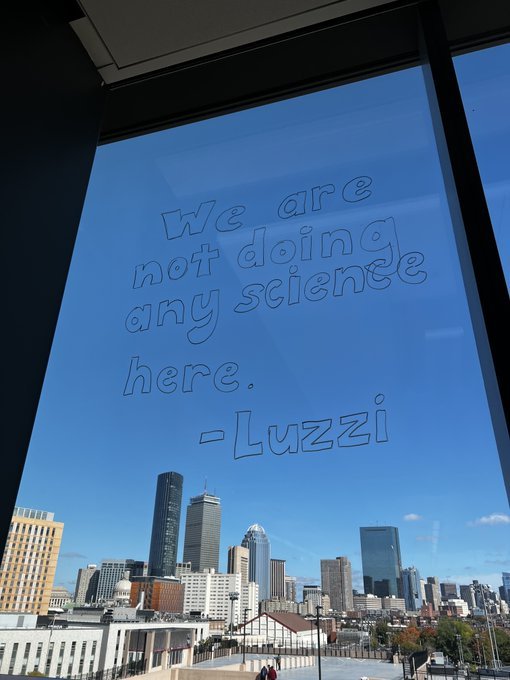
[Image ID: A window with a phrase written in marker, ‘We are not doing science here’ -Luzzi.]
A student told the provost, “This doesn’t matter. You are monitoring us, and collecting data for science.” The provost shot back, “we are not doing science here.” This ill-considered remark turned into an on-campus meme. I’m sure it was just blurted in the heat of the moment, but wow, was that the wrong thing to tell a bunch of angry scientists.
From the transcript, it’s clear that this is where the provost lost the crowd. He accused the students of “feeling emotion” and explaining that the data would be used for “different kinds of research. We want to see how students move around the lab.”
Now, as it happens, ISEC has an IoT lab where they take these kinds of measurements. When they do those experiments, students are required to go through IRB, get informed consent, all the stuff that the provost had bypassed. When this is pointed out, the provost says that they had been given an IRB waiver by the university’s Human Research Protection Program (HRPP).
Now a prof gets in on the action, asking, pointedly: “Is the only reason it doesn’t fall under IRB is that the data will not be published?” A student followed up by asking how the university could justify blowing $50,000 on surveillance gear when that money would have paid for a whole grad student stipend with money left over.
The provost’s answers veer into the surreal here. He points out that if he had to hire someone to monitor the students’ use of their desks, it would cost more than $50k, implying that the bill for the sensors represents a cost-savings. A student replies with the obvious rejoinder — just don’t monitor desk usage, then.
Finally, the provost started to hint at the underlying rationale for the sensors, discussing the cost of the facility to the university and dangling the possibility of improving utilization of “research assets.” A student replies, “If you want to understand how research is done, don’t piss off everyone in this building.”
Now that they have at least a vague explanation for what research question the provost is trying to answer, the students tear into his study design, explaining why he won’t learn what he’s hoping to learn. It’s really quite a good experimental design critique — these are good students! Within a few volleys, they’re pointing out how these sensors could be used to stalk researchers and put them in physical danger.
The provost turns the session over to an outside expert via a buggy Zoom connection that didn’t work. Finally, a student asks whether it’s possible that this meeting could lead to them having a desk without a sensor under it. The provost points out that their desk currently doesn’t have a sensor (remember, the students ripped them out). The student says, “I assume you’ll put one back.”
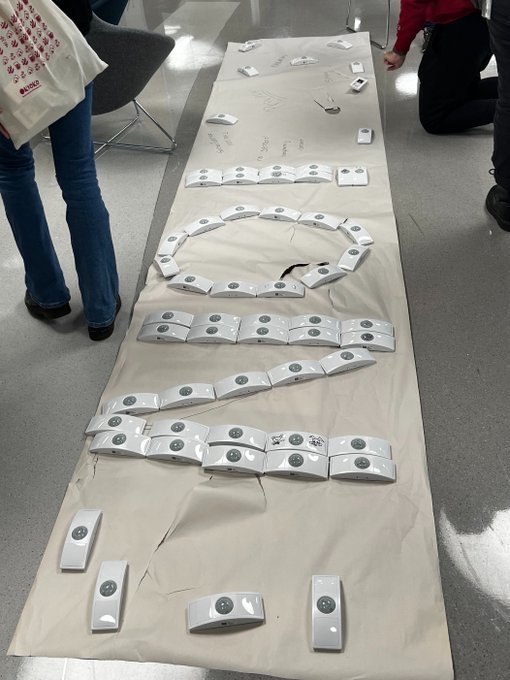
[Image ID: A ‘public art piece’ in the ISEC lobby — a table covered in sensors spelling out ‘NO!,’ surrounded by Sharpie annotations decrying the program.]
They run out of time and the meeting breaks up. Following this, the students arrange the sensors into a “public art piece” in the lobby — a table covered in sensors spelling out “NO!,” surrounded by Sharpie annotations decrying the program.
Meanwhile, students are still furious. It’s not just that the sensors are invasive, nor that they are scientifically incoherent, nor that they cost more than a year’s salary — they also emit lots of RF noise that interferes with the students’ own research. The discussion spills onto Reddit:
https://www.reddit.com/r/NEU/comments/xx7d7p/northeastern_graduate_students_privacy_is_being/
Yesterday, the provost capitulated, circulating a memo saying they would pull “all the desk occupancy sensors from the building,” due to “concerns voiced by a population of graduate students.”
https://twitter.com/maxvonhippel/status/1578101964960776192
The shitty technology adoption curve is relentless, but you can’t skip a step! Jumping straight to grad students (in a privacy lab) without first normalizing them by sticking them on the desks of poor kids in underfunded schools (perhaps after first laying off a computer science teacher to free up the budget!) was a huge tactical error.
A more tactically sound version of this is currently unfolding at CMU Computer Science, where grad students have found their offices bugged with sensors that detect movement and collect sound:
https://twitter.com/davidthewid/status/1387909329710366721
The CMU administration has wisely blamed the presence of these devices on the need to discipline low-waged cleaning staff by checking whether they’re really vacuuming the offices.
https://twitter.com/davidthewid/status/1387426812972646403
While it’s easier to put cleaners under digital surveillance than computer scientists, trying to do both at once is definitely a boss-level challenge. You might run into a scholar like David Gray Widder, who, observing that “this seems like algorithmic management of lowly paid employees to me,” unplugged the sensor in his office.
https://twitter.com/davidthewid/status/1387909329710366721
This is the kind of full-stack Luddism this present moment needs. These researchers aren’t opposed to sensors — they’re challenging the social relations of sensors, who gets sensed and who does the sensing.
https://locusmag.com/2022/01/cory-doctorow-science-fiction-is-a-luddite-literature/
[Image ID: A flier inviting ISEC grad students to attend an unadvertised 'listening session' with the vice-provost. It is surmounted with a sensor that has been removed from beneath a desk and annotated in Sharpie to read: 'If found by David Luzzi suck it.']
41K notes
·
View notes
Text
like even just speaking in my own context as a social science PhD student in a canadian university, graduate students are required to apply for federal grants for their funding. this includes a detailed proposal about what you plan to research. the federal government lists what research projects they are interested in funding each year, and it’s understood that you need to pitch your research in such a way that you are appealing to those research aims, including what kinds of questions you want to ask and what you’re hoping to contribute to your field. the language you use must speak to furthering Canadian interests. this is not a neutral process! How critical do you think academic scholarship can be when their funding depends on flattering the policy and research aims of a settler colonial capitalist state? and many, many academics are fine with this, there is no secret hoard of marxists in universities chained to the whims of Big Government or whatever, but like even using this one singular example you can see how maybe the shit they teach you in universities is concerned with speaking to funding agencies before there is any consideration for discovering, like, capital T Truth about the world. nothing you read is produced out of nowhere, and if you’re reading academic scholarship that means that there is a titanic amount of financial and administrative infrastructure that that knowledge is produced in. If you believe you go to university to learn the truth about the world, that university is a progressive institution because they teach marx to undergrads, then I’m sorry but you’ve bought into both the liberal myth that universities are primarily concerned with teaching the truth and the conservative myth that universities are SJW hellholes
2K notes
·
View notes
Text
"In a first-ever human clinical trial, an mRNA cancer vaccine developed at the University of Florida successfully reprogrammed patients’ immune systems to fiercely attack glioblastoma, the most aggressive and lethal brain tumor.
The results in four adult patients mirrored those in 10 pet dog patients suffering from brain tumors whose owners approved of their participation.
The discovery represents a potential new way to recruit the immune system to fight treatment-resistant cancers using an iteration of mRNA technology and lipid nanoparticles, similar to COVID-19 vaccines, but with two key differences: use of a patient’s own tumor cells to create a personalized vaccine, and a newly engineered complex delivery mechanism within the vaccine.
“Instead of us injecting single particles, we’re injecting clusters of particles that are wrapping around each other like onions,” said senior author Elias Sayour, M.D., Ph.D., a UF Health pediatric oncologist who pioneered the new vaccine, which like other immunotherapies attempts to “educate” the immune system that a tumor is foreign.
“These clusters alert the immune system in a much more profound way than single particles would.”
Among the most impressive findings was how quickly the new method spurred a vigorous immune-system response to reject the tumor, said Sayour, principal investigator at the University’s RNA Engineering Laboratory and McKnight Brain Institute investigator who led the multi-institution research team.
“In less than 48 hours, we could see these tumors shifting from what we refer to as ‘cold’—very few immune cells, very silenced immune response—to ‘hot,’ very active immune response,” he said.
“That was very surprising given how quick this happened, and what that told us is we were able to activate the early part of the immune system very rapidly against these cancers, and that’s critical to unlock the later effects of the immune response,” he explained in a video (below).
Glioblastoma is among the most devastating diagnoses, with median survival around 15 months. Current standard of care involves surgery, radiation and some combination of chemotherapy.
The new report, published May 1 in the journal Cell, is the culmination of seven years of promising studies, starting in preclinical mouse models.
In the cohort of four patients, genetic material called RNA was extracted from each patient’s own surgically removed tumor, and then messenger RNA (mRNA)—the blueprint of what is inside every cell, including tumor cells—was amplified and wrapped in the newly designed high-tech packaging of biocompatible lipid nanoparticles, to make tumor cells “look” like a dangerous virus when reinjected into the bloodstream to prompt an immune-system response.
The vaccine was personalized to each patient with a goal of getting the most out of their unique immune system...
While too early in the trial to assess the clinical effects of the vaccine, the patients either lived disease-free longer than expected or survived longer than expected. The 10 pet dogs lived a median of 4.5 months, compared with a median survival of 30-60 days typical for dogs with the condition.
The next step, with support from the Food and Drug Administration and the CureSearch for Children’s Cancer foundation, will be an expanded Phase I clinical trial to include up to 24 adult and pediatric patients to validate the findings. Once an optimal and safe dose is confirmed, an estimated 25 children would participate in Phase 2."
-via Good News Network, May 11, 2024
youtube
-video via University of Florida Health, May 1, 2024
#cw cancer#cw death#cw animal death#medical news and technology#cancer#brain cancer#cancer treatment#tumor#brain tumor#florida#university of florida#medicine#biology#cell biology#mrna#mrna vaccine#vaccines#oncology#good news#hope#Youtube
369 notes
·
View notes
Text
My alternate universe fantasy colonial Hong Kong is more authoritarian and just as racist but less homophobic than in real life, should I change that?
@floatyhands asked:
I’m a Hongkonger working on a magical alternate universe dystopia set in what is basically British colonial Hong Kong in the late 1920s. My main character is a young upper middle-class Eurasian bisexual man.
I plan to keep the colony’s historical racial hierarchy in this universe, but I also want the fantasy quirks to mean that unlike in real life history, homosexuality was either recently decriminalized, or that the laws are barely enforced, because my boy deserves a break. Still, the institutions are quite homophobic, and this relative tolerance might not last. Meanwhile, due to other divergences (e.g. eldritch horrors, also the government’s even worse mishandling of the 1922 Seamen's Strike and the 1925 Canton-Hong Kong Strike), the colonial administration is a lot more authoritarian than it was in real history. This growing authoritarianism is not exclusive to the colony, and is part of a larger global trend in this universe.
I realize these worldbuilding decisions above may whitewash colonialism, or come off as choosing to ignore one colonial oppression in favor of exaggerating another. Is there any advice as to how I can address this issue? (Maybe I could have my character get away by bribing the cops, though institutional corruption is more associated with the 1960s?) Thank you!
Historical Precedent for Imperialistic Gay Rights
There is a recently-published book about this topic that might actually interest you: Racism And The Making of Gay Rights by Laurie Marhoefer (note: I have yet to read it, it’s on my list). It essentially describes how the modern gay rights movement was built from colonialism and imperialism.
The book covers Magnus Hirschfeld, a German sexologist in the early 1900s, and (one of) his lover(s), Li Shiu Tong, who he met in British Shanghai. Magnus is generally considered to have laid the groundwork for a lot of gay rights, and his research via the Institut für Sexualwissenschaft was a target of Nazi book-burnings, but he was working with imperial governments in an era where the British Empire was still everywhere.
Considering they both ended up speaking to multiple world leaders about natural human sexual variation both in terms of intersex issues and sexual attraction, your time period really isn’t that far off for people beginning to be slightly more open-minded—while also being deeply imperialist in other ways.
The thing about this particular time period is homosexuality as we know it was recently coming into play, starting with the trial of Oscar Wilde and the rise of Nazism. But between those two is a pretty wildly fluctuating gap of attitudes.
Oscar Wilde’s trial is generally considered the period where gay people, specifically men who loved men, started becoming a group to be disliked for disrupting social order. It was very public, very scandalous, and his fall from grace is one of the things that drove so many gay and/or queer men underground. It also helped produce some of the extremely queercoded classical literature of the Victorian and Edwardian eras (ex: Dracula), because so many writers were exploring what it meant to be seen as such negative forces. A lot of people hated Oscar Wilde for bringing the concept to such a public discussion point, when being discreet had been so important.
But come the 1920s, people were beginning to wonder if being gay was that bad, and Mangus Hirschfeld managed to do a world tour of speaking come the 1930s, before all of that was derailed by wwii. He (and/or Li Shiu Tong) were writing papers that were getting published and sent to various health departments about how being gay wasn’t an illness, and more just an “alternative” way of loving others.
This was also the era of Boston Marriages where wealthy single women lived together as partners (I’m sure there’s an mlm-equivalent but I cannot remember or find it). People were a lot less likely to care if you kept things discreet, so there might be less day to day homophobia than one would expect. Romantic friendships were everywhere, and were considered the ideal—the amount of affection you could express to your same-sex best friend was far above what is socially tolerable now.
Kaz Rowe has a lot of videos with cited bibliographies about various queer disasters [affectionate] of the late 1800s/early 1900s, not to mention a lot of other cultural oddities of the Victorian era (and how many of those attitudes have carried into modern day) so you can start to get the proper terms to look it up for yourself.
I know there’s a certain… mistrust of specifically queer media analysts on YouTube in the current. Well. Plagiarism/fact-creation scandal (if you don’t know about the fact-creation, check out Todd in the Shadows). I recommend Kaz because they have citations on screen and in the description that aren’t whole-cloth ripped off from wikipedia’s citation list (they’ve also been published via Getty Publications, a museum press).
For audio-preferring people (hi), a video is more accessible than text, and sometimes the exposure to stuff that’s able to pull exact terms can finally get you the resources you need. If text is more accessible, just jump to the description box/transcript and have fun. Consider them and their work a starting place, not a professor.
There is always a vulnerability in learning things, because we can never outrun our own confirmation bias and we always have limited time to chase down facts and sources—we can only do our best and be open to finding facts that disprove what we researched prior.
Colonialism’s Popularity Problem
Something about colonialism that I’ve rarely discussed is how some colonial empires actually “allow” certain types of “deviance” if that deviance will temporarily serve its ends. Namely, when colonialism needs to expand its territory, either from landing in a new area or having recently messed up and needing to re-charm the population.
By that I mean: if a fascist group is struggling to maintain popularity, it will often conditionally open its doors to all walks of life in order to capture a greater market. It will also pay its spokespeople for the privilege of serving their ends, often very well. Authoritarians know the power of having the token supporter from a marginalized group on payroll: it both opens you up directly to that person’s identity, and sways the moderates towards going “well they allow [person/group] so they can’t be that bad, and I prefer them.”
Like it or not, any marginalized group can have its fascist members, sometimes even masquerading as the progressives. Being marginalized does not automatically equate to not wanting fascism, because people tend to want fascist leaders they agree with instead of democracy and coalition building. People can also think that certain people are exaggerating the horrors of colonialism, because it doesn’t happen to good people, and look, they accept their friends who are good people, so they’re fine.
A dominant fascist group can absolutely use this to their advantage in order to gain more foot soldiers, which then increases their raw numbers, which puts them in enough power they can stop caring about opening their ranks, and only then do they turn on their “deviant” members. By the time they turn, it’s usually too late, and there’s often a lot of feelings of betrayal because the spokesperson (and those who liked them) thought they were accepted, instead of just used.
You said it yourself that this colonial government is even stricter than the historical equivalent—which could mean it needs some sort of leverage to maintain its popularity. “Allowing” gay people to be some variation of themselves would be an ideal solution to this, but it would come with a bunch of conditions. What those conditions are I couldn’t tell you—that’s for your own imagination, based off what this group’s ideal is, but some suggestions are “follow the traditional dating/friendship norms”, “have their own gender identity slightly to the left of the cis ideal”, and/or “pretend to never actually be dating but everyone knows and pretends to not care so long as they don’t out themselves”—that would signal to the reader that this is deeply conditional and about to all come apart.
It would, however, mean your poor boy is less likely to get a break, because he would be policed to be the “acceptable kind of gay” that the colonial government is currently tolerating (not unlike the way the States claims to support white cis same-sex couples in the suburbs but not bipoc queer-trans people in polycules). It also provides a more salient angle for this colonial government to come crashing down, if that’s the way this narrative goes.
Colonial governments are often looking for scapegoats; if gay people aren’t the current one, then they’d be offered a lot more freedom just to improve the public image of those in power. You have the opportunity to have the strikers be the current scapegoats, which would take the heat off many other groups—including those hit by homophobia.
In Conclusion
Personally, I’d take a more “gays for Trump” attitude about the colonialism and their apparent “lack” of homophobia—they’re just trying to regain popularity after mishandling a major scandal, and the gay people will be on the outs soon enough.
You could also take the more nuanced approach and see how imperialism shaped modern gay rights and just fast-track that in your time period, to give it the right flavour of imperialism. A lot of BIPOC lgbtqa+ people will tell you the modern gay rights movement is assimilationalist, colonialist, and other flavours of ick, so that angle is viable.
You can also make something that looks more accepting to the modern eye by leaning heavily on romantic friendships that encouraged people waxing poetic for their “best friends”, keeping the “lovers” part deeply on the down low, but is still restrictive and people just don’t talk about it in public unless it’s in euphemisms or among other same-sex-attracted people because there’s nothing wrong with loving your best friend, you just can’t go off and claim you’re a couple like a heterosexual couple is.
Either way, you’re not sanitizing colonialism inherently by having there be less modern-recognized homophobia in this deeply authoritarian setting. You just need to add some guard rails on it so that, sure, your character might be fine if he behaves, but there are still “deviants” that the government will not accept.
Because that’s, in the end, one of the core tenants that makes a government colonial: its acceptance of groups is frequently based on how closely you follow the rules and police others for not following them, and anyone who isn’t their ideal person will be on the outs eventually. But that doesn’t mean they can’t have a facade of pretending those rules are totally going to include people who are to the left of those ideals, if those people fit in every other ideal, or you’re safe only if you keep it quiet.
~ Leigh
#colonialism#colonization#worldbuilding#alternate history#history#lgbt#china#hong kong#british empire#ask
541 notes
·
View notes
Text

Free Khalida Jarrar! The feminist, leftist, and Palestinian scholar was seized from her home in El-Bireh, occupied Palestine, in the morning hours of 26 December 2023 as part of mass arrests by Zionist forces in the West Bank of occupied Palestine during the genocide in Gaza.
Jarrar is a historical leftist leader with the PFLP and is currently a scholar and researcher at the Muwatin Institute at Birzeit University. In fact, she was scheduled to appear on 27 December at a panel convened by Jadaliyya on imprisonment in the time of genocide.
She is a lifelong advocate for the liberation of political prisoners and was targeted specifically for her statements and advocacy for the liberation of Palestinian prisoners.Jarrar has been imprisoned on multiple occasions by the occupation regime, including in 2015, when her administrative detention without charge or trial drew global protests before she was then transferred to the occupation military courts.
In 2019, she was once again seized by the occupation regime. While she was imprisoned, her daughter Suha tragically passed away. She was denied the right to see Suha's body and attend her funeral before she was released again in 2021.
During both of her times of imprisonment, she established independent educational programs to teach the imprisoned minor girls the high school education they were denied as well as the adult women prisoners their rights under international law.
She discusses her imprisonment in the book by RamzyBaroud and Ilan Pappe, "Our vision for liberation;" her piece is published at the PalestineChronicle:
Samidoun network
@ SamidounPP
394 notes
·
View notes
Text
One of the messes rn is that the campus protests are being treated as a single entity but they’re really not - each is a different protest against a different institution, with different sets of demands. Imho the ones that have gone to the agreement table are the ones that had a combo of a more reasonable administration and a set or demands that were enforceable. (I.e several universities have said they would vote on divestment later, or provide spaces for discussion and safety for Palestinian students, or be more transparent about funding etc). Others haven’t been all that clear about what the demands are at all or have included stuff that is unenforceable, such as the UCLA protest demand that the university shut down an entire research center that studies Israel. They have to kind of be taken on a one by one basis here
136 notes
·
View notes
Text
all the time, gotta walk away, for a moment, take a break, infuriated, when reading about European implementation of forced labour in plantations (especially in the nineteenth and early twentieth centuries, whether it's sugarcane or rubber or tea or banana, whether it's British plantations in Assam or Malaya; Belgian plantations in Congo; French plantations in West Africa; Dutch plantations in Java; United States-controlled plantations in Haiti or Guatemala or Cuba or Colombia). and the story is always: "and then the government tried to find a way to reimpose slavery under a different name. and then the government destroyed vast regions of forest for monoculture plantations. and then the government forced thousands to become homeless and then criminalized poverty to force people into plantation work or prison labor." like the plantation industries are central (entangled with every commodity and every infrastructure project) and their directors are influencing each other despite spatial distance between London and the Caribbean and the Philippines.
and so the same few dozen administrators and companies and institutions keep making appearances everywhere, like they have outsized influence in history. like they are important nodes in a network. and they all cite each other, and write letters to each other, and send plant collection gifts to each other, and attend each other's lectures, and inspire other companies and colonial powers to adapt their policies/techniques. not to over-simplify, but sometimes it's like the same prominent people, and a few key well-placed connections and enablers in research institutions or infrastructure companies. they're prison wardens and lietuenant governors and medical doctors and engineers and military commanders and botanists and bankers, and they all co-ordinate these multi-faceted plans to dispossess the locals, build the roads, occupy the local government, co-erce the labour, tend the plants, ship the products.
so you'll be reading the story of like a decade in British Singapore and you're like "oh, i bet that one ambitious British surgeon who is into 'economics' and is obsessed with tigers and has the big nutmeg garden in his backyard is gonna show up again" and sure enough he does. but also sometimes you're reading about another situation halfway across the planet and then they surprise you (because so many of them are wealthy and influential and friends with each other) and it'll be like "oh you're reading about a British officer displacing local people to construct a new building in Nigeria? surprise cameo! he just got a letter from the dude at the university back in London or the agriculturalist in Jamaica or the urban planner from Bombay, they all went to school together and they're also all investors in the same rubber plantation in Malaya". so you'll see repeated references to the same names like "the British governor of Bengal" or "[a financial institution or bank from Paris or New York City]" or "[a specific colonial doctor/laboratory that does unethical experiments or eugenics stuff]" or "lead tropical agriculture adviser to [major corporation]" or "the United Fruit Company" and it's like "not you again"

324 notes
·
View notes
Text
The Best News of Last Week - January 09, 2023
1. Top British universities offer Afghan women free courses until Taliban lift learning ban
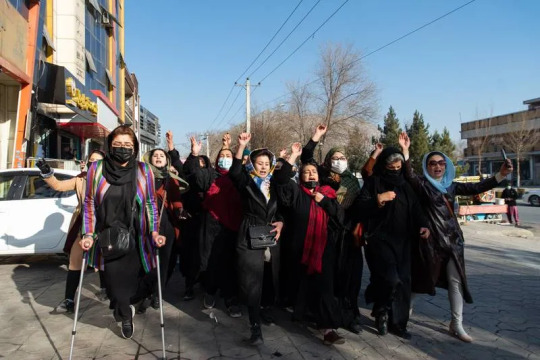
Afghanistan's ruling Taliban announced last month that women would no longer be able to study at universities and higher education establishments. Institutions were told to implement the ban as soon as possible.
Now, a number of British universities have teamed up through FutureLearn to offer the women in Afghanistan free access to digital learning platforms. Girls and women with internet access will be able to study more than 1,200 courses from top institutions at no cost to themselves.
2. Arizona Gov. Katie Hobbs extends protections to LGBTQ+ state employees and contractors

Arizona’s newly elected Gov. Katie Hobbs (D) signed an executive order extending employment protections to state employees and contractors who are LGBTQ+.
As the Human Rights Campaign reports, the executive order, signed on Hobbs’s first day in office Tuesday, directs the state’s Department of Administration to update hiring, promotion, and compensation policies for all state agencies to prohibit discrimination based on sexual orientation and gender identity and include provisions in all new state contracts to prohibit discrimination based on sexual orientation and gender identity.
3. EU Carbon Emissions Drop To 30-Year Lows

It was supposed to be a dirty autumn and winter, with European nations scrambling to replace Russian gas with high-polluting coal. But according to the Centre for Research on Energy and Clean Air, the cold seasons so far have been the cleanest in more than 30 years.
4. Critically endangered rhinoceros gives birth to calf at Kansas City Zoo on New Year's Eve

The Kansas City Zoo got a special start to the new year: A critically endangered subspecies of rhinoceros gave birth to a calf on Dec. 31, officials announced. The calf is walking, nursing and even playing with its mother, Zuri, animal specialists said.
5. Cancer Vaccine to Simultaneously Kill and Prevent Brain Cancer Developed

Scientists are harnessing a new way to turn cancer cells into potent, anti-cancer agents. A new stem cell therapy approach eliminates established brain tumors and provides long-term immunity, training the immune system to prevent cancer from returning.
link to the paper …
6. The US has approved use of the world's first vaccine for honey bees.
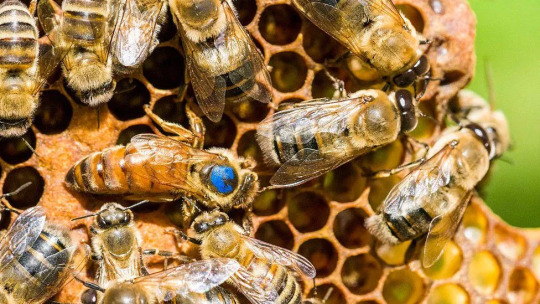
It was engineered to prevent fatalities from American foulbrood disease, a bacterial condition known to weaken colonies by attacking bee larvae. As pollinators, bees play a critical role in many aspects of the ecosystem.
The vaccine could serve as a "breakthrough in protecting honey bees", Dalan Animal Health CEO Annette Kleiser said in a statement. It works by introducing an inactive version of the bacteria into the royal jelly fed to the queen, whose larvae then gain immunity.
7. Cat missing for nearly 6 years reunited with owner thanks to microchip

West Sacramento woman got the surprise of a lifetime Saturday when she was reunited with her missing cat after nearly 6 years thanks to microchip.
- - -
That's it for this week. If you liked this post you can support this newsletter with a small kofi donation:
Buy me a coffee ❤️
Subscribe for more weekly wholesome news...
478 notes
·
View notes
Text
Literature produced in the ex-colonial countries but produced directly in languages which had been imported initially from Europe provides one kind of archive for the metropolitan university to construe the textual formation of ‘Third World Literature’; but this is not the only archive available, for the period after decolonization has also witnessed great expansion and consolidation of literary traditions in a number of indigenous languages as well [...] Not much of this kind of literature is directly available to the metropolitan literary theorists because, erudite as they usually are in metropolitan languages, hardly any of them has ever bothered with an Asian or African language. But parts and shades of these literatures also become available in the West, essentially in the following three ways. By far the greater part of the archive through which knowledge about the so-called Third World is generated in the metropolises has traditionally been, and continues to be, assembled within the metropolitan institutions of research and explication, which are characteristically administered and occupied by overwhelmingly Western personnel. Non-Western individuals have also been employed in these same institutions – more and more so during the more recent, post-colonial period, although still almost always in subordinate positions. The archive itself is dispersed through myriad academic disciplines and genres of writing – from philological reconstruction of the classics to lowbrow reports by missionaries and administrators; from Area Study Programmes and even the central fields of the Humanities to translation projects sponsored by Foundations and private publishing houses alike – generating all kinds of classificatory practices. A particularly large mechanism in the assembly of this archive has been the institutionalized symbiosis between the Western scholar and the local informant, which is frequently re-enacted now – no doubt in far more subtle ways –between the contemporary literary theorist of the West, who typically does not know a non-Western language, and the indigenous translator or essayist, who typically knows one or two. This older, multidisciplinary and somewhat chaotic archive is greatly expanded in our own time, especially in the area of literary studies, by a developing machinery of specifically literary translations – a machinery not nearly as highly developed as the one that exists for the circulation of texts among the metropolitan countries themselves, but not inconsiderable on its own terms. Apart from the private publishing houses and the university presses which may publish such translations of their own volition or under sponsorship programmes, there are state institutions such as the Sahitya Akademi in India, as well as international agencies such as UNESCO, not to speak of the American ‘philanthropic’foundations such as the Rockefeller-funded Asia Society, which have extensive programmes for such publications. Supplementing these translations are the critical essay and its associated genres, usually produced by an indigenous intellectual who reads the indigenous language but writes in one of the metropolitan ones. Some of this kind of writing becomes available in the metropolises, creating versions and shadows of texts produced in other spaces of the globe, but texts which frequently come with the authority of the indigenous informant.
Aijaz Ahmed, In Theory: Nations, Classes, Literatures
172 notes
·
View notes
Note
Do you have any idea where all the money in education IS going? People talk about administrators, but their percentage of the overall budget seems lowish? Facilities are expensive, but often paid for with bequests, no? Where the hell is all the money going?
The same place it's going in every other capitalistic American enterprise: to senior executives, endowments, and other places that decidedly do not "trickle down" (because you know, it never does). See my many previous posts about how college costs skyrocketed starting in the 1980s and post-secondary higher education was transformed from something in which most of the costs were governmentally subsidized to something expected to be paid (at higher and higher levels) either privately out of the consumer's pocket or from thousands of dollars in student loans. Because you guessed it, Reaganomics.
I can tell you one place it absolutely is NOT going, i.e. salaries of faculty and staff, at least in the less capitalistically sexy fields of study. The university where I work never hurts for money in the business and law schools, but because I am in the humanities/education/history, yeah, our department's budget is not in great shape. Of course, yes, COVID hit the higher-education sector like crazy (as it did everywhere else) and universities haven't figured how to recover from that, but just as with the rest of America, it's a model that is designed to funnel the vast majority of profits, i.e. from skyrocketing student tuition rates and other increased fees, to the highly compensated senior leadership and very little to the academics who do the work that makes the place, you know, RUN.
This is a bugaboo for both me and every other academic I know, because (again, just as with the rest of capitalism) it doesn't HAVE to be this way. I shouldn't be trying to manage a department that has to rely heavily on adjunct faculty every quarter and doesn't have a sustainable long-term scheduling or research model, because we're so badly understaffed with core tenure-track faculty and they won't let us hire any more, while constantly cutting our budget and giving us laughable raises (mine, after getting sterling performance reviews across the board, was a whole... 72 extra cents an hour. I wish I was joking). There is money tied up in the institution and the establishment (and as noted, I work at a well-regarded and highly-ranked private university, so it's not a matter of not having enough), but the system distributes it in a way that is inequitable and results in enforced scarcity, especially in the humanities. It's not that there isn't money to pay us fairly, it's just that they have chosen not to, because they exist in the same capitalist system as the rest of the west.
This is why there have been strikes by graduate and early-career academics in both the UK and US (I have worked/studied/taught in both places, and they're both BAD for paying lower-level academics and even established-career academics), because they simply do not pay us enough to live on or build a career on (by a long shot, ESPECIALLY if you're the only person in your household and don't have shared expenses with a partner/roommate/several roommates). This is after most of us have several advanced degrees and the debt resulting from such. We get burned out, we can't make a living in this field, we leave, and it's hollowed out even further. So. Yeah.
89 notes
·
View notes
Text

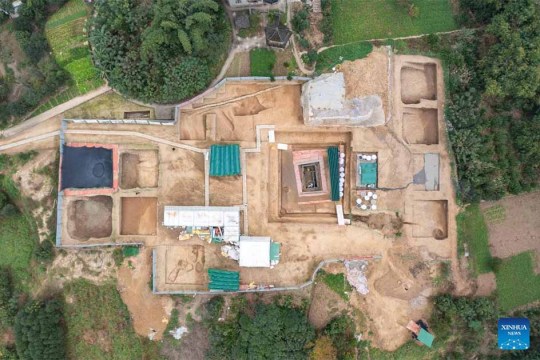
A Rare Western Han Dynasty Tomb Found in Southwest China
A well-preserved tomb, dating back to the Western Han Dynasty (202 BC-25 AD), with a clear recorded year has been discovered in Wulong District of southwest China's Chongqing Municipality, the Chongqing Cultural Relics and Archaeology Research Institute said Tuesday.
This archaeological project is a rescue excavation and protection work carried out to forge cooperation with the Baima project, the last of a cascade of hydropower stations on the section of the Wujiang River in Chongqing.
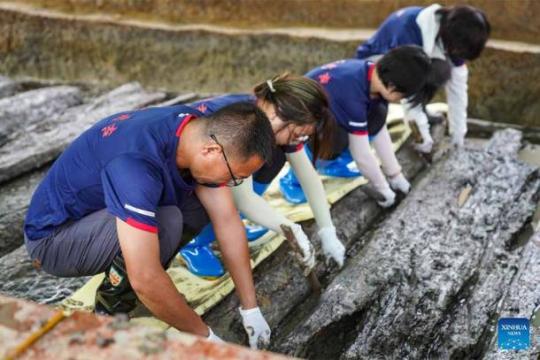




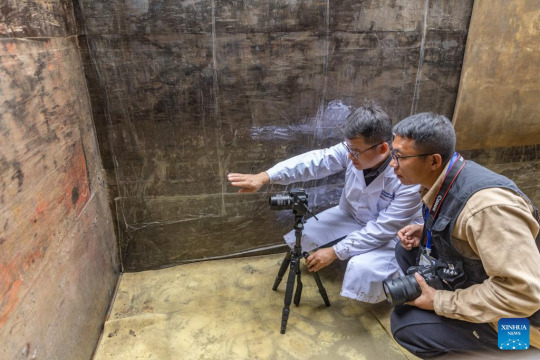
With the approval of the National Cultural Heritage Administration, the Chongqing Cultural Relics and Archaeology Research Institute set up a work team of more than 20 people from different archaeology research institutes and universities to excavate the site in March this year.
According to Huang Wei, the leader of the archaeological project, a collection of tombs dating from the Han Dynasty (202 BC-220 AD) to the Six Dynasties period (222-589) were newly discovered as part of this project. Among them, the tomb dating back to the Western Han Dynasty was the most important, and more than 600 precious cultural relics such as lacquerware, wood ware, bamboo ware, pottery and bronze ware were unearthed from the tomb.
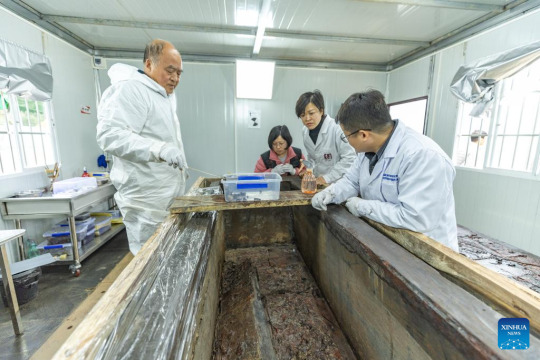
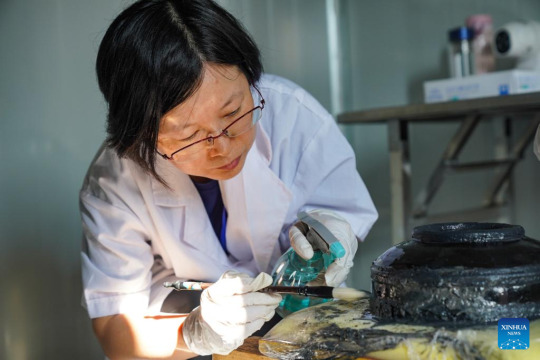
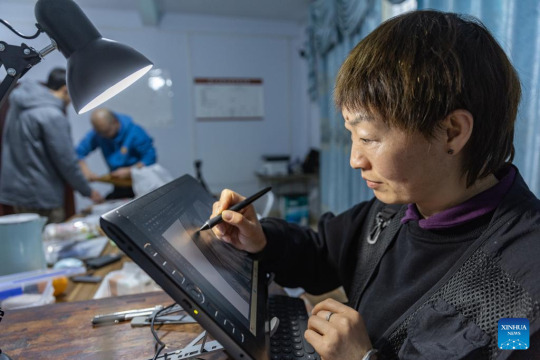
Due to the tomb being filled with water throughout the year, it remains undisturbed and unharmed, and the funerary objects in the tomb are well preserved.
"What is exciting about this discovery is not just the large number of unearthed artifacts but also the list of burial items containing a precise year record, which has been verified as 193 BC, providing clarity on the tomb's burial timeframe. An unearthed jade ware from the tomb shows the prominent position of the tomb owner," Huang said.
The list of burial items found in the tomb is complete and clearly records the name, quantity and size of the funerary objects.
The tomb discovered this time is the one containing the largest quantity of lacquered wood and bamboo wares ever found at one time in the upper reaches of the Yangtze River in China, said Bai Jiujiang, head of the Chongqing Cultural Relics and Archaeology Research Institute.



Based on publicly available information, it is also the earliest tomb of the Western Han Dynasty found in China, with a clear recorded year, according to Bai.
This is a major archaeological discovery regarding the Qin and Han Dynasties in the Wujiang River Basin, offering physical evidence and important basic research materials for future study of burial customs and the comparative analysis of famous artifacts from the early Western Han Dynasty, according to the archaeologists.




#A Rare Western Han Dynasty Tomb Found in Southwest China#Tomb Holding Hundreds of Ancient Relics Unearthed in China#Western Han Dynasty#ancient tomb#ancient grave#grave goods#ancient artifacts#archeology#archeolgst#history#history news#ancient history#ancient culture#ancient civilizations#ancient china#chinese history#chinese art
63 notes
·
View notes
Text
something else about "it's such a small amount of money," the disclose demand, institutional complicity, and 1968: in 1967, SDS uncovered potential links between columbia and the institute for defence analysis, a weapons research program connected to the department of defense. the administration denied any claims and suspended six SDS members demanding that the STEM professors researching weapons for use in vietnam be fired. during the occupation of the president's office in low library, students looking through his personal file discovered documents proving a link to the IDA and its jason division, affiliated with the CIA. the university administration ultimately agreed to all SDS demands, including ending institutional affiliation with the IDA, and in the fall even called on the united states to immediately withdraw troops from vietnam.
#and the admin agreed again for the apartheid boycott#i don't understand why the divestment by a $14 billion institution is seen as silly. this isn't exactly boycotting a starbucks coffee
26 notes
·
View notes
Text
Universities secretly sold their students to online casinos

End-stage capitalism’s defining characteristic is making money rather than making things. Think of how Jack Welch destroyed GE by transforming it from a manufacturing company to a financial engineering shop:
https://the.ink/p/like-capitalism-itself-business-journalism
Hospitals are invoice-generating factories with a sideline in medicine. The electronic health record only incidentally records your health. Its primary purpose is to record your billing-codes:
https://www.beckershospitalreview.com/ehrs/physicians-spending-nearly-2-hours-a-day-on-ehr-tasks-outside-work.html
And universities? Ugh. Most universities now have more administrators than faculty:
https://www.jamesgmartin.center/2022/08/administrative-bloat-harms-teaching-and-learning/
Much of that “administration” comes down to begging alums for money to funnel into vast endowments, but heaven forfend those endowments would be used to cover payroll and other essentials, even in a pandemic emergency:
https://www.forbes.com/sites/reneemorad/2020/04/21/harvard-under-fire-for-accepting-nearly-9-million-in-coronavirus-relief-funds/
Nor are endowment funds available to pay the education workers who actually teach students, but can’t afford the rent, food, or family:
https://www.capradio.org/articles/2022/11/14/nearly-50000-university-of-california-graduate-student-employees-launch-open-ended-strike/
The point of the endowment is to increase the size of the endowment — not to improve educational outcomes or research. That’s why Harvard is “A hedge fund that has a university”:
https://www.wsj.com/articles/a-hedge-fund-that-has-a-university-1510615228
This is the overwhelming logic of capital: capital exists to increase capital, and the underlying mechanism for that increase is irrelevant. This was the reasoning behind the surreal bid to sell the .ORG nonprofit registry to a secretive hedge-fund.
The point of the .ORG registry is to host domain records for nonprofits; incidentally, this throws off some extra money that is turned into grants for public interest projects. The board decided to sell off .ORG so it could make more of these grants, despite the fact that this would compromise the mission of hosting .ORG domain records:
https://www.eff.org/press/releases/org-domain-registry-sale-ethos-capital-rejected-stunning-victory-public-interest
Likewise, this was the reasoning of the Mountain Equipment Co-Op board when they decided to sell off the member-owned co-op (“the most trusted brand in Canada”) to a US private equity fund without consulting the members:
https://pluralistic.net/2020/09/16/spike-lee-joint/#casse-le-mec
The expand-capital-at-all-costs mindset is a virulent species of brain worms. It’s the basis for surreal movements like effective altruism, which encourages people who want to do good for the world to sell out to the most toxic industries on Earth, amass gigantic fortunes, and then, upon their death, donate them to causes that in some way remediate the harms they themselves wreaked:
https://en.wikipedia.org/wiki/Earning_to_give
In his new book Survival of the Richest, Douglas Rushkoff calls this “The Mindset” — “I need to make vast amounts of money, no matter what the consequences, or I will not be able to afford to insulate myself from the consequences of how I made all that money”:
https://pluralistic.net/2022/09/13/collapse-porn/#collapse-porn
Once you let people with The Mindset anywhere near your institution, they will take it over and turn it into a paperclip-maximizing killing machine, one that abandons and then betrays its mission to increase its profits, eventually killing its host. Anything that can’t go on forever will eventually stop:
https://doctorow.medium.com/anything-that-cant-go-on-forever-will-eventually-stop-110ba9711133
That’s what’s happened to higher ed. It’s not just the payroll full of starving adjuncts, facilities workers, etc. It’s not just the way that universities join forces with textbook monopolists to gouge their students:
https://pluralistic.net/2021/10/07/markets-in-everything/#textbook-abuses
Beyond academics having to rely on food-stamps, students going into lifetime debt to enrich predatory textbook monopolies, and the other horrors of financialized higher ed, there’s the special evil of college sports.
Like all finance-bro motivated reasoning, college sports are sold as a way to do well by doing good: “Look! We’re giving poor people a chance at a great education based on their physical prowess, and we’re racking up tons of money for the university!”
But — like all finance schemes — college sports is a self-licking ice-cream cone that destroys the lives of the people who generate value for it, even as it devours its host institution from within.
Did you know that until very recently, college athletes weren’t allowed to make a penny from their labor?
https://www.scotusblog.com/2021/06/in-unanimous-ruling-court-agrees-with-athletes-that-ncaa-violated-antitrust-laws/
Did you know that those same athletes experience lifelong brain injuries?
https://jamanetwork.com/journals/jamanetworkopen/fullarticle/2791303
Did you know that college sports are a cesspit of long-term, officially tolerated sexual abuse?
https://www.theguardian.com/sport/2021/nov/30/ohio-state-michigan-doctors-sexual-abuse-college-football
Did you know that the highest paid public employee in many states is a football coach at a state college?
https://www.profootballnetwork.com/highest-paid-college-football-coaches-2022/
Did you know that college coaches conspired with the rich parents to steal sport-related admission slots from poor kids and give them to mediocre winners of the orifice-lottery?
https://en.wikipedia.org/wiki/Varsity_Blues_scandal
In many universities — whether public or private — the sports program effectively runs the show. Take the University of New Hampshire: back in 2016, a university librarian named Robert Morin left his life’s savings to the school after 50 years of service. Morin lived frugally for that half century and amassed a personal fortune of $4m.
He believed so deeply in the university’s mission that he turned it all over to the school without any restrictions. Talk about earning to give! The university blew Morin’s gift on a new jumbotron for their sports stadium:
https://www.washingtonpost.com/news/morning-mix/wp/2016/09/16/university-to-buy-1-million-football-scoreboard-with-thrifty-librarians-money-outraging-critics/
The people who see universities as inconvenient adjuncts to exploitative sports teams know that there are still rivals within higher ed who think the point of the school is to educate students.
That’s why the universities that arranged to allow sports gambling websites to target the young people in their care did so in secret.
https://www.nytimes.com/2022/11/20/business/caesars-sports-betting-universities-colleges.html?unlocked_article_code=AAAAAAAAAAAAAAAACEIPuonUktbfqYhlSVUZAybfQMMmqBCdnr_EybEnj2XlaTONTixe1KEfDpSc-kHCILdlZsU-xS-aWN5MK_okQ_h2w-BSJAptVwys6NOiqagyHh8U-8i1T39kmNXER6w5-jvnKWDmIe5ymOTn-hvbbzH1XKzbg2lxIVpvvZY2d12t3yMDwKmVFfVnmYUrhYdXDZ54TT8KZiWY7bK_W1glZoLwPlyL4RI2WupZRTnQgdWfjrsCew5TAl7FJ2httSd-sJgPfYNKY9usakIoa8H8gr4OCmd3LYvPBpQ5RILck70Coqf9dPDE9RFVhqXegnp2EK4F
Writing for the New York Times, Anna Betts, Andrew Little, Elizabeth Sander, Alexandra Tremayne-Pengelly and Walt Bogdanich reveal the extraordinary corruption and depravity of college administrators who colluded with sports book companies to bring gambling to campus.
Implicated in the scandal are such top schools as Michigan State, U Colorado Bolder, Louisiana State, Syracuse and Texas Christian Univeristy (mission: “to educate individuals to think and act as ethical leaders and responsible citizens”).
On the casino side, the major player is Caesar’s, which is only fitting — Caesar’s was driven to bankruptcy by private equity who managed to financialize a casino into ruin:
https://www.ft.com/content/a0ed27c6-a2d4-11e7-b797-b61809486fe2
Caesar’s offered universities millions of dollars for the right to directly sports betting to students. The MSU deal, brokered by university officials Paul Schager and Alan Haller, was worth $8.4m. That is to say, Caesar’s was asking the university to help it drain at least $8.4m from students’ bank accounts in order to turn a profit.
Louisiana State U did a similar deal with Caesar’s, and then embarked on a direct marketing campaign to sell sports gambling to students who were too young to legally place a bet.
LSU says this was a mistake. Cody Worsham, a university official who holds two offices — associate athletic director and chief brand officer (!!) — said that Caesar’s and LSU “share a commitment to responsible, age-appropriate marketing.”
Meanwhile, U Colorado Boulder struck a deal where it earned a $30 bounty every time a student went from non-gambler to gambler — in other words, Boulder didn’t make money by advertising gambling to students — it made money only if its students started gambling.
These student gambling programs are designed to keep children betting even if they lose money, with teaser offers that refund some losses if students keep placing bets.
This is obviously unsavory stuff. That’s why the architects of these programs went to enormous lengths to keep it secret. The state schools involved funneled their deals through private marketing agencies that were shielded from FOIA requests, specifically to prevent the public from learning how public universities were conducting their affairs.
As MSU executive associate athletic director Paul Schager put it: “With the multimedia rights holder, public institutions like Michigan State no longer have to disclose all those sponsorship deals. This helps with the sponsors being able to spend what they feel is appropriate without having the public or employees or stockholders question that investment.”
The deals themselves are far-reaching. As part of MSU’s Caesar’s deal, tailgate parties before big games would be “Caesarized,” with the casino providing ad-copy for the live announcers to read to attendees. As a figleaf, $25,000 of the millions that MSU received from Caesar’s was earmarked for gambling addiction education.
The deals weren’t just kept secret from the public — they were also hidden from top university oversight. At UC Bolder, the Board of Regents was informed of the deal mere hours before it was announced to the public.
These deals have only been running for a couple months and it’s too soon to chart the long-term harms they’ll create in the student body. But, the Times* notes, there is an one harm that surfaced almost immediately: student athletes are now subject to vicious abuse by their fellow students, who lose money they can’t afford when their peers lose a game.
[Image ID: A gaudy casino floor. In the foreground is a figure in college graduation robes giving a double thumbs-up. His head is a grinning skull with a mortarboard.]
665 notes
·
View notes